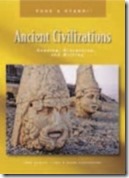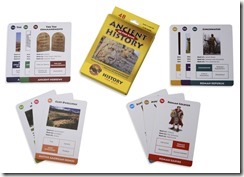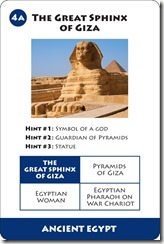During my junior year of high school I was required to take World History. It is by far the most boring class I can remember, and my grades certainly reflected my lack of enthusiasm. It was guided by the expertise of my gym teacher, if that tells you anything. Her idea of teaching was to stand in front of the room and drone on while we students just soaked it all in. Then come test time, we were to squeeze it all out onto the paper. It is the only class where I remember falling asleep. My memory of this occasion is so vivid because my forehead actually hit the desk and woke me up. True story. :)
Too bad my World History teacher hadn’t reviewed some of the materials from
The Classical Historian. Perhaps studying World History would have been a bit more engaging.

The Classical Historian’s mission statement is:
Our mission is to help teachers provide students the skills of the historian, challenge students to research and analyze various perspectives, and respectfully and honestly guide students in thoughtful analysis, discussion, and interpretation of the past.
The Classical Historian is inspired by the best that is offered in the Great Tradition of Western Education: honesty, virtue, patience, and logical analysis of evidence and conclusions.
The Classical Historian complete history curriculum teaches:
1. The Tools of the Historian (Historical Analysis)
2. History Content
3. The Socratic Discussion
4. Analytical Writing
I received several Ancient History products, intended for grades 6-8, from The Classical Historian to review. They include:
Ancient History Go Fish Game $11.95
Teaching the Socratic Discussion DVD Curriculum $79.99
Take a Stand! Ancient Civilization’s Student’s Edition $18.85
Ancient Civilizations Curriculum Guide $24.99
The above items can be purchased individually or in discounted bundle packages.
Teaching the Socratic Discussion DVD Curriculum includes three DVDs and a 77-page, spiral-bound book. Two of the discs are of John De Gree, the author of the program, speaking to an audience about his background and philosophy of education, along with the goals of the program. DVD 1 is about a 20- minute abbreviated version of another longer (approximately 1-hour) DVD titled “Extended Introduction”. DVD 2, titled “Tools of the Historian” shows Mr. De Gree teaching two students the lessons in the included book. These lessons run anywhere from 6-15 minutes and are intended for both the student and parent to watch.
From the website:
After this DVD course, the student will know how to distinguish between fact and opinion, make good historical judgment, analyze primary or secondary sources, use quotes effectively in argumentation, how to paraphrase historical text, how to analyze and answer interpretive questions in history, how to conduct research, how to participate in a Socratic Discussion in History, and how to write analytical essays including: Writing an Outline, Writing a Rough Draft, and Revising. The complete DVD course includes over seven complete hours of instructional taping, 13 class lessons, a student course booklet and parent guide.
The DVD course uses the Socratic Method and therefore can be implemented with any history text.
When the DVD course is purchased in a
bundle for a particular topic, such as Ancient Civilizations, a fourth DVD is included in the package. This fourth DVD shows Mr. De Gree taking a group of students through the correlating
Take a Stand! book, applying the methods taught in the DVD course. These lessons are also meant to be viewed by both teacher and student.
The quality of the DVDs is a little rough, and I struggled with this at first. Also, I found the “Extended Introduction” to be way more information than needed, and I was really hoping for more instruction on the program, rather than background. However, the lesson portion, regardless of quality, was helpful with a clear model of how to teach history using this method.

The
Take a Stand! Ancient Civilizations Student’s Edition covers Early Human Civilizations, Mesopotamia, Egypt, and Kush, Ancient Hebrews, Judaism, Ancient Greece, Greek Literature and Mythology, Ancient India, Hinduism and Buddhism, Ancient China, Confucianism, The Roman Republic, and Christianity.
Each topic is covered in Part 1 with a short paragraph and a question for the students to research, defend, discuss, and complete a writing assignment. Part 2 of the book is titled "Social Studies Literacy Curriculum" and covers the material also included in the DVD curriculum, such as how to approach research, argument, and the writing assignments.
When it is paired with the DVD course, there are 32 lessons total. Lesson plans, a schedule, and teacher tips are available with the
Ancient Civilizations Curriculum Guide.
Take a Stand! sample.
Curriculum Guide sample
I feel it would be difficult to use the
Take a Stand! books without the DVD curriculum. The
Curriculum Guide, which is not included when purchasing the
Take a Stand! books individually,
gave the books some needed structure to better implement them in your history studies.
In order to successfully use the Ancient Civilizations curriculum, two text books are needed:
World History Detective and
Global History and Geography. Since these were not included in my package, I am unable to give feedback on the titles. The method can be used with any history text. However, the curriculum is structured around use of these particular titles.
Of course, history doesn’t need to be all about discussion and writing. There are games too!
 The Ancient History Go Fish Game
The Ancient History Go Fish Game is actually four games in one: Go Fish, Collect the Cards, Chronology, and Continents. Basic facts, chronology, geography, and social skills are learned while playing with the 48 categorized cards. In Go Fish, players collect sets of four cards. Collect the Cards involves reading hints on the cards and obtaining the card when the correct place, person, or thing is answered. Chronology and Continents are more speed and matching games.
Go Fish and Collect the Cards were the preferred games in our house. We accidentally played Go Fish incorrectly at first, but I liked the results. The cards are categorized in sets of four, and the players are to ask for the category when playing. Instead, we asked for individual cards within a category. This forced us to read and examine the cards more closely. When we played our second game, Collect the Cards, I noticed my son had already memorized some of the groupings simply by playing Go Fish once. The information on the cards is not detailed (see example pic below), but the could be a jumping point for more research.

The box indicates the card game is for ages 3 and up, but most very young children probably won't get much out of the game. They may enjoy the pictures or matching up the categories, but the card game is really best suited for older children, especially those that are able to read the information on them. Also, some knowledge is required to actually play, so this really is a learn-as-you-go game that is paired well with the curriculum.
Having just completed the
Teaching the Classics course, which uses the Socratic discussion for literature studies and is available through another provider who also recommends The Classical Historian, I was familiar with the approach. However, it did take me a little while to wrap my head around how to use the curriculum. Since the
Curriculum Guide seemed to pull it together for me, an improvement would be to include some sort of lesson plan for both the
DVD Curriculum and the
Take a Stand! books, even if it is an abbreviated version of the larger guide. This will help those users who purchase the products individually. Once I got the big picture of how to use the program and got over the DVD quality issue, it was easy to see that the content and model of the Socratic Discussion for the study of history is quite strong in this curriculum. It definitely goes well beyond your typical read, study bits and facts, and spit it out method of many middle school history programs.
The Classical Historian has
many games and curriculum which cover a variety of time periods, in addition to Economics, which would appeal to Classical homeschoolers. Their variety of
games would be a great addition to any history curriculum.







